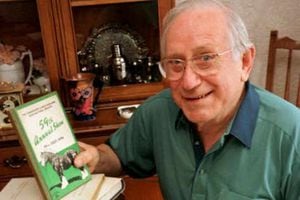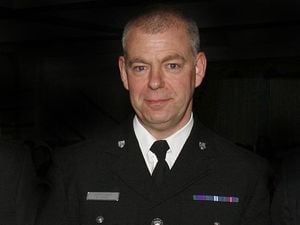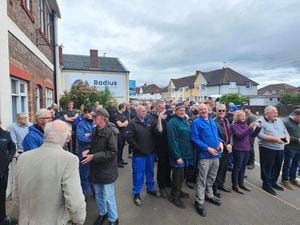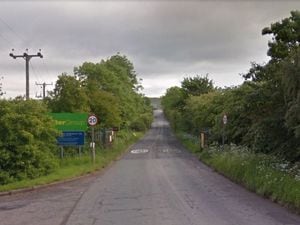Obituary. Gordon Riley 1922-2010
Gordon Riley, whose funeral was being held today, was an old-school journalist who became one of the founders of the Shropshire Star, and was involved in various aspects of public life and charity work in Shropshire over many years.

Gordon Riley, whose funeral was being held today, was an old-school journalist who became one of the founders of the Shropshire Star, and was involved in various aspects of public life and charity work in Shropshire over many years.
In the days when the Wellington Journal and Shrewsbury News frowned on giving bylines to its reporters, Gordon Riley's sports reports appeared under the name of "Max Field" - a pseudonym taken from his wife's maiden name, Maxfield.
Later he had the byline "Don Riley". Gordon reckoned this gave him a more impressive byline than using his full name.
He said he had never chosen a career in journalism, but was "chucked into it by a headmaster."
Gordon, who was born in April 1922, left school at the age of 15 and became a grocer's apprentice in Shrewsbury.
A year after leaving, the senior master of the school came to his house with a message from the headmaster, who had remembered that at school Gordon was not too bad at what used to be called "Composition" - essays and so on.
And it so happened that the brother of the senior master was the manager of the Wellington Journal office in Shrewsbury, and the paper wanted a junior reporter. The head wanted young Gordon to give up the grocery business and go and get this job.
There was some parental discussion as he was getting 7s 6d at the grocers, and the Journal only offered him 6s 6d.
"My mother was very reluctant to see me lose a shilling in this burgeoning career," said Gordon. However, his father, an ex-Army man, suggested he should go for it.
During the war he served in the RAF.
Later he became the chief reporter of the Wellington Journal and Shrewsbury News, based in its offices at Queen Street, Wellington, and joined the Express & Star at its Shrewsbury office in 1960.
He was one of the founders of the Shropshire Star when it was set up at Ketley in 1964, and served as its first News Editor.
In 1973 - he was then Deputy Editor of the Shropshire Star - he took up the post of public relations officer of Telford Development Corporation.
During his long career Gordon, who, incidentally, was able to do shorthand at 180 words a minute, covered the last execution in Shropshire, standing outside Shrewsbury Jail where George Riley was hanged in 1961, and was also one of the first reporters on the scene of the 1950 murder of the elderly licensee of the Queens Head Inn at Ketley Sands.
It was not until some time afterwards that Gordon realised that while driving there he had caught, in the glare of his headlights, the murderer Frank Griffin walking away from the scene. Griffin was later hanged.
In another incident the boxer Randolph Turpin swung a punch at him when he went to get an interview with him following his wedding at Wellington, which became a media circus.
Turpin didn't connect.
"I was light on my feet in those days," said Gordon.
He was twice chairman of the Shropshire NUJ branch, the second to revive it from difficult times. For his services, he was made the branch's first Life Member.
Among his many other roles, he was honorary press officer to the Friends of the Royal Shrewsbury Hospital for over 30 years.
He worked with the Wellington Cancer Campaign Committee for 12 years, publicising its work, and also in Wellington, Gordon was a founder of the repertory theatre and the voluntary theatre club based in the old swimming baths in Walker Street.
Gordon was secretary of Wellington Licensed Victuallers' Association and for many years was the only non-licensee in the UK to hold such a post. He was also secretary of Wrekin Golf Club for six years until 1960.
He wrote and designed a special souvenir brochure for Wellington Urban Council, to commemorate the Coronation of Queen Elizabeth
When living in Condover, from 1965, he was church and later vicar's warden at St Andrew's Church. He helped raise funds to repair the tower which had become dangerous, and also to repair the leaking roof of the village hall.
During a lengthy period between the death of one vicar and the appointment of a successor he had to direct the running of the parish.
He was founder of the Shropshire Press Ball, being chairman for the last ten years through to the late 1970s, until the event, which raised money for charity, ran out of big name bands and volunteers to do the preparation work (although it has since been revived).
At other times, Gordon wrote the history of the Shropshire Football Association to mark its centenary and, later, combined with Arthur Rowley to write and produce a special booklet to mark the great footballer's epic goal scoring record that has still to be beaten
For a number of years, Gordon was honorary secretary and a presenter for the Hospital Broadcasting Service which operated from a studio on the old South site at Copthorne, Shrewsbury, not only to the RSH but to Oswestry Orthopaedic Hospital, Wrekin Hospital, The Beeches (Madeley) and Bishop's Castle Hospitals in its early years.
Over 30 years he did voluntary publicity work for the Shropshire and Mid Wales Hospice at Bicton, Shrewsbury, Shrewsbury Crime Prevention Panel, Shrewsbury Neighbourhood Watch Committee, and was a founder of the CCTV (Shrewsbury) Trust, the volunteer members of which pioneered the closed circuit television system to help in crimebusting and removal of fear of crime in Shrewsbury town centre.
His wife and he were founder volunteer members of the Shrewsbury Crown Court Witness Service and Gordon helped when his wife, Freda, founded Shrewsbury Youth Crime Prevention Panel. Together the couple served the League of Friends for a joint total of over 60 years.
He spent many years as a voluntary steward at Shrewsbury Flower Show, and wrote for publication the definitive history of the Shropshire Horticultural Society and the show to mark its centenary in 1975.
For three years Gordon was also chairman of the Shropshire branch of the Institute of Advanced Motorists, and in the early days of Radio Shropshire, Gordon did a series of programmes called Riley Remembers, using music and talk to look back on his life as a scribe.
And what a full life it was!
By Toby Neal





